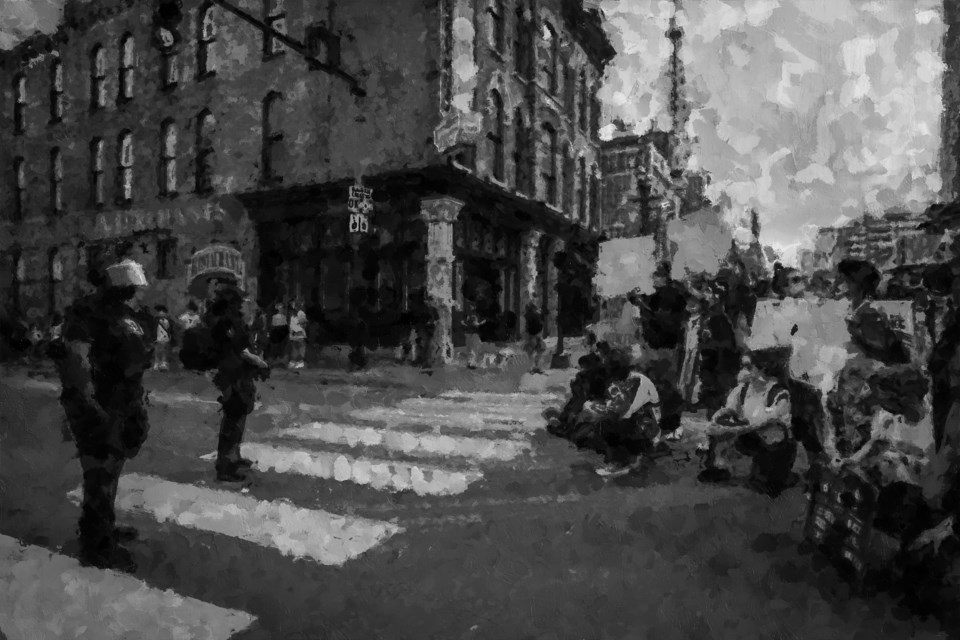With racism and police violence becoming a major topic of discussion this month, I want to add some historical context and an explanation of a basic concept to the discourse.
If we’re going to have a discussion about race - which we’re going to do, right now - we should acknowledge that Canada has its own pretty nasty history with people who aren’t white.
The RCMP and their precursors, the North-West Mounted Police, were initially created to keep the peace in what were considered, at the time, the North-West Territories - almost all of western Canada, northern Ontario and Quebec and the current territories. Take a wild guess who the people were who were being policed.
Some NWMP outposts and officers gained the trust of local peoples and chiefs, but not all did. In most of the major conflicts of the time - the North-West Rebellion in Saskatchewan, the forcible moves of some communities to make way for the Canadian Pacific Railway, enforcement of the Indian Act and smaller, regional squabbles - the NWMP and Indigenous people ended up as enemies. Later, when Canada’s now-infamous residential school system was created, often it was the Mounties who were tasked with taking children to the schools.
Add into that the modern history of incidents involving police and Indigenous people - a higher than average death and violence rate in police interactions, the Saskatoon Police Service’s “starlight tours” and the death of Neil Stonechild, the ongoing Wet’suweten controversy, hundreds of unsolved missing and murdered Indigenous women and girls cases, pipeline protests, etc. - and there’s plenty of history between Indigenous people and authorities.
Racism in Canada is not solely an anti-Indigenous thing, either. Our government has pretty much covered everybody at one point.
Asian people? There was the head tax, labour violations along the Canadian Pacific Railway, immigration bans from China, riots in Vancouver aimed at Asian-owned businesses, Japanese internment camps and more..
Black people? Carding, stop-and-frisk rules, a much higher than average police violence rate and others. It’s important to note that while most protests around Black Lives Matter are inspired by American deaths, there are Canadian ones as well.
Indian? The Komagata Maru, a Japanese ship full of Indian immigrants, was turned away from port in Vancouver in 1914. When the boat reached Indian shores, British police opened fire, killing 20 people and ending with hundreds of arrests.
Jewish? The MS St. Louis, a German ship full of Jewish refugees, was not allowed to dock in Canada, forcing the ship to head back to the one place it would be allowed to be - Germany. Out of the 620 people onboard the ship, at least a quarter would be later murdered by the Nazis.
Notably, when a Canadian immigration agent was asked in 1939 how many Jewish people would be allowed in Canada after the Second World War, they said “none is too many”.
All that doesn’t even touch individual acts of racism, discrimination or outright hate crimes members of each community may face, including within our own community.
With historical context now out of the way, let’s tackle that concept.
White people, as a general group, have been able to benefit from institutions and systems in ways other people from other groups may not have. That is unfair and should be changed. Every Canadian should be able to enjoy the rights and freedoms I, as a white guy, have. We should all trust the police. We should all be able to access health care if needed. We should all be able to get through a day, a week, a month without an interaction that turns negative or dangerous because of something that isn’t our fault.
This doesn’t mean a white person didn’t work hard to get where they are in life, nor does it mean they didn’t deserve it. It means that, in essence, a white person would have had a harder time getting where they’re at if they weren’t white. It means you can get a loan easier. It means you can walk around a rich neighbourhood without someone pulling a gun on you or calling the cops. It means you don’t get singled out in a crowd because of your race - it also means you don’t have to answer every awkward question about race from your white friends, which I’m sure must be exhausting.
Pointing out racism should not be seen as an accusation unless someone directly calls you a racist. If someone says they’re anti-racism and you immediately get defensive, that says much more about you than it does the anti-racist. The fact is, a lot of Canadians have benefitted from our country treating some people like dirt. It’s not about changing the system to bring down white people - it’s about bringing everyone else up to the same level.
I know that I'm not going to have as intimate a knowledge of what racism looks like today as a person of colour would. I'm lucky in that regard. That said, why should anyone have to be afraid of something that is beyond their control? Why should anyone face difficulties that I didn't have to face for no good reason?
I want to get rid of racist attitudes. They are destructive and hold nothing of value. That said, just shouting at people isn’t going to do it.
If we’re going to do that, we have to work off the same set of facts, acknowledge our own Canadian history and recognize and validate the experiences of others. We don’t have to apologize for things we didn’t do, but we must know that, every day, our continued lives are built on a system that deliberately kept people down.




